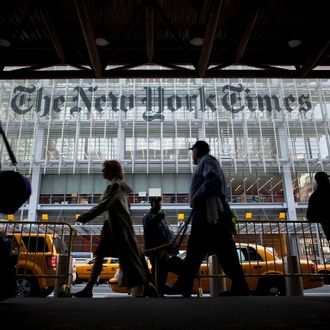
The New York Times says it is “looking into” accusations that a recent article on the painter Piero di Cosimo lifted most of its first paragraph straight from Wikipedia. The similarities, in a piece by reporter Carol Vogel, were first pointed out by MediaBistro’s FishbowlNY, and are of particular media interest following the firing of BuzzFeed’s viral politics editor Benny Johnson for similar offenses (albeit at least 41 of them), which included plagiarism not only from Wikipedia but even flimsier sources like About.com and internet cesspool Yahoo! Answers. But with journalism living increasingly online, where prominent attribution via links is a vital part of the lexicon, and aggregation widely accepted so long as proper credit is given, the source of the words is irrelevant.
Here’s Vogel’s apparent offense from the Times:
Artists can be eccentric, but the quirks of the Italian Renaissance master Piero di Cosimo are legendary. He is said to have been terrified of thunderstorms and so pyrophobic that he rarely cooked his food, subsisting mostly on hard-boiled eggs that he prepared 50 at a time while heating glue for his art. He didn’t clean his studio. He didn’t trim the trees in his orchard. Giorgio Vasari, the Renaissance biographer, described Piero as living “more like a beast than a man.”
And the Wikipedia version, which is itself sourced to Vasari, an Italian historian, via the magazine Storica:
Reportedly, he was frightened of thunderstorms, and so pyrophobic that he rarely cooked his food; he lived largely on hard-boiled eggs, which he prepared 50 at a time while boiling glue for his artworks. He also resisted any cleaning of his studio, or trimming of the fruit trees of his orchard; he lived, wrote Vasari, “more like a beast than a man.
But in the eyes of the Washington Post’s Gene Weingarten, who wrote about the BuzzFeed Benny saga today, Johnson’s crimes are not a big deal, because his work (mostly GIF listicles) didn’t matter anyway:
[…] to be guilty of theft, one must steal something of some intrinsic value. […] When the dreadful Jayson Blair egregiously stole the on-the-scene reporting of journalists who had been to crime scenes that Blair claimed to have been at but had not, that was indeed grand theft. But I contend you cannot steal something of no intrinsic value; say, a fart. Someone who steals a fart is a weird, disreputable person, perhaps, and even someone deserving of firing, perhaps, but not a thief. This is Mr. Benny Johnson.
The same should apply to Vogel’s obvious copying, which is lazy at best. But as Weingarten continues, it becomes clear that his argument is less about Johnson’s misdeeds than an outdated rant against the state of internet writing in general:
Reading a listicle in Buzzfeed, just what level of diligence does a reader expect? Is a reader really being fooled here? […]
There is a crappy new world of crappy journalism, and their listicles have been a crappy part of it, and I’m guessing that there are other listicle writers at Buzzfeed and elsewhere who are today doing that comical finger-pulling-the-collar-out-to-get-some-neck-air gesture, trying to remember how many times they lifted a phrase or two from places like Wikipedia because they have nine crap-writing deadlines in two days, and, besides, who the hell cares?
It’s all bad, folks. But don’t start calling this bullhockey plagiarism, because that denies the seriousness of plagiarism.
What, then, when it happens in the pages of the New York Times, bastion of perhaps the least crappy journalism around? The Vogel example lands at an opportune time to undermine Weingarten’s argument that lifting facts — word for word — from a place like Wikipedia is somehow less bad than stealing an “original insight” because it is solely a symptom of bad listicle-making. (“There’s a difference between crappy, lazy Internet writing and real plagiarism and I contend that when you start calling the first thing the second thing, you belittle the seriousness of real plagiarism,” he writes. “It all starts seeming like kindergarten-level failure to footnote.”) But in a serious story on a renaissance painter in the Paper of Record? It looks worse, but the standards, as made clear by both organizations, are — and should be — the same, especially as BuzzFeed tightens its standards and presents itself as a journalistic organization. Any form of plagiarism is crappy, lazy journalism, no matter the medium.
“Because journalism cannot own up to its heavily derivative nature, it must enforce originality on the level of the sentence,” writes Weingarten, quoting Malcolm Gladwell to identify his problem with media ethics as “the narcissism of small differences.” That’s true, but it’s also the rules all have agreed to play by, especially online, where links and sources can be added so easily. There is originality to be found in conceptualization, construction, and the deployment of previously known facts and anecdotes. Is the Vogel example, assuming it is isolated, on par with the sins of Jayson Blair, Stephen Glass, or even Jonah Lehrer? No, and neither are Johnson’s. But that doesn’t mean they’re not “real” plagiarism.





























